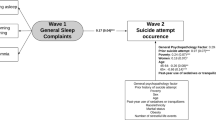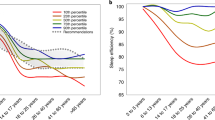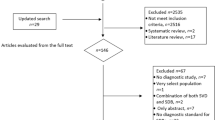Abstract
Background
Sleep problems are known to compound the negative effects of other health issues, such as eating disorders and the associated behavior of binge eating. Previous studies suggested associations between binge eating and sleep problems, but the strength of the relationship is unknown.
Methods
We conducted a systematic review with meta-analyses examining the relationship between binge eating and sleep parameters. We searched for studies in Scopus, PubMed, and PsycInfo. The quality of evidence, including risk of bias, was assessed with adaptations of the Newcastle-Ottawa Scale and the Joanna Briggs Institute Critical Appraisal Checklist for Quasi-Experimental Studies, depending on study design. Data was synthesized as the difference in sleep between people who did or did not have binge eating.
Results
Thirty-one reports of studies met our eligibility criteria. Results are presented in 12 meta-analyses. In the 7 reports of studies (with 4448 participants) that assessed poor overall sleep quality, we found poorer overall sleep quality in people with binge eating compared to people without binge eating, with a standardized mean difference of 0.77 (95% confidence interval [CI] 0.61–0.92; P < 0.001), which is a large effect size. In addition, we found evidence that people with binge eating had significantly greater hypersomnia/daytime sleepiness (7 reports of studies with 4370 participants), insomnia (5 reports of studies with 12,733 participants), and difficulty falling asleep (3 reports of studies with 4089 participants) compared to people without binge eating, with moderate effect sizes (standardized mean differences of 0.57–0.66).
Conclusions
People with binge eating exhibit poorer overall sleep quality compared to people without binge eating, and may also exhibit greater hypersomnia/daytime sleepiness, insomnia, and difficulty falling asleep. It is recommended that healthcare professionals routinely screen for poor overall sleep quality when treating people with binge eating—and address sleep difficulties when present.
This is a preview of subscription content, access via your institution
Access options
Subscribe to this journal
Receive 12 print issues and online access
$259.00 per year
only $21.58 per issue
Buy this article
- Purchase on Springer Link
- Instant access to full article PDF
Prices may be subject to local taxes which are calculated during checkout





Similar content being viewed by others
Data availability
Data collected and used in this review can be requested from the corresponding author.
References
American Psychiatric Association. Diagnostic and statistical manual of mental disorders. 5th ed. Arlington: VA, American Psychiatric Publishing. 2013.
Kessler RC, Berglund PA, Chiu WT, Deitz AC, Hudson JI, Shahly V, et al. The Prevalence and Correlates of Binge Eating Disorder in the World Health Organization World Mental Health Surveys. Biol Psychiatry. 2013;73:904–14.
Kessler RC, Shahly V, Hudson JI, Supina D, Berglund PA, Chiu WT, et al. A comparative analysis of role attainment and impairment in binge-eating disorder and bulimia nervosa: results from the WHO World Mental Health Surveys. Epidemiol Psychiatr Sci. 2014;23:27–41.
Javaras KN, Pope HG, Lalonde JK, Roberts JL, Nillni YI, Laird NM, et al. Co-occurrence of binge eating disorder with psychiatric and medical disorders. J Clin Psychiatry. 2008;69:266–73.
de Jonge P, Alonso J, Stein DJ, Kiejna A, Aguilar-Gaxiola S, Viana MC, et al. Associations between DSM-IV mental disorders and diabetes mellitus: a role for impulse control disorders and depression. Diabetologia. 2014;57:699–709.
Raevuori A, Suokas J, Haukka J, Gissler M, Linna M, Grainger M, et al. Highly increased risk of type 2 diabetes in patients with binge eating disorder and bulimia nervosa. Int J Eat Disord. 2015;48:555–62.
Wassenaar E, Friedman J, Mehler PS. Medical Complications of Binge Eating Disorder. Psychiatr Cli North Am. 2019;42:275–86.
da Luz FQ, Sainsbury A, Mannan H, Touyz S, Mitchison D, Hay P. Prevalence of obesity and comorbid eating disorder behaviors in South Australia from 1995 to 2015. Int J Obes. 2017;41:1148–53.
da Luz FQ, Hay P, Touyz S, Sainsbury A. Obesity with Comorbid Eating Disorders: Associated Health Risks and Treatment Approaches. Nutrients. 2018;10:1–9.
Allison KC, Spaeth A, Hopkins CM. Sleep and Eating Disorders. Curr Psychiatry Rep. 2016;18:1–8.
Blumfield ML, Bei B, Zimberg IZ, Cain SW. Dietary disinhibition mediates the relationship between poor sleep quality and body weight. Appetite. 2018;120:602–8.
Fatima Y, Doi SAR, Mamun AA. Sleep quality and obesity in young subjects: a meta-analysis: sleep quality and obesity. Obes Rev. 2016;17:1154–66.
Yahia N, Brown C, Potter S, Szymanski H, Smith K, Pringle L, et al. Night eating syndrome and its association with weight status, physical activity, eating habits, smoking status, and sleep patterns among college students. Eat Weight Disord. 2017;22:421–33.
Hoon E, González-Chica DA, Vakulin A, McEvoy D, Zwar N, Grunstein R, et al. Population-based analysis of sociodemographic predictors, health-related quality of life and health service use associated with obstructive sleep apnoea and insomnia in Australia. Aust J Prim Health. 2021;27:304–11.
Lundahl A, Nelson TD. Sleep and food intake: a multisystem review of mechanisms in children and adults. J Health Psychol. 2015;20:794–805.
Fairburn C. Cognitive behavior therapy and eating disorders. New York:Guilford; 2008.
Allison KC, Tarves EP. Treatment of night eating syndrome. Psychiatr Clin North Am. 2011;34:785–96.
Tanahashi T, Kawai K, Tatsushima K, Saeki C, Wakabayashi K, Tamura N, et al. Purging behaviors relate to impaired subjective sleep quality in female patients with anorexia nervosa: a prospective observational study. Biopsychosoc Med. 2017;11:22.
Cohen J. Statistical power analysis for the behavioral sciences. 2nd ed. ed. Hillsdale, NJ: L Erlbaum Associates;1988.
Allison KC, Spaeth A, Hopkins CM. Sleep and Eating Disorders. Curr Psychiatry Rep. 2016;18:92.
Lauer CJ, Krieg J-C. Sleep in eating disorders. Sleep Med Rev. 2004;8:109–18.
Lombardo C, Battagliese G, Baglioni C, David M, Violani C, Riemann D. Severity of insomnia, disordered eating symptoms, and depression in female university students. Clin Psychol (Aust Psychol Soc). 2014;18:108–15.
Lombardo C, Battagliese G, Venezia C, Salvemini V. Persistence of poor sleep predicts the severity of the clinical condition after 6 months of standard treatment in patients with eating disorders. Eat Behav. 2015;18:16.
Tkachenko O, Olson EA, Weber M, Preer LA, Gogel H, Killgore WDS. Sleep difficulties are associated with increased symptoms of psychopathology: Sleep and the Processing of Emotional Information. Exp Brain Res. 2014;232:1567–74.
Chaput J-P, Després J-P, Bouchard C, Tremblay A. The association between sleep duration and weight gain is dependent on disinhibited eating behaviors in adults. Sleep. 2011;12:S13–S.
Chabas D, Foulon C, Gonzalez J, Nasr M, Lyon-Caen O, Willer J-C, et al. Eating disorder and metabolism in narcoleptic patients. Sleep. 2007;30:1267–73.
Brondel L, Romer MA, Nougues PM, Touyarou P, Davenne D. Acute partial sleep deprivation increases food intake in healthy men. Am J Clin Nutr. 2010;91:1550–9.
de Zwann M, Mitchell JE, Seim HC, Specker SM, Pyle RL, Raymond NC, et al. Eating related and general psychopathology in obese females with binge eating disorder. Int J Eat Disord. 1994;15:43–52.
Cerolini S, Ballesio A, Ferlazzo F, Lucidi F, Lombardo C. Decreased inhibitory control after partial sleep deprivation in individuals reporting binge eating: preliminary findings. PeerJ. 2020;8:e9252-e.
Cerolini S, Rodgers RF, Lombardo C. Partial sleep deprivation and food intake in participants reporting binge eating symptoms and emotional eating: preliminary results of a quasi-experimental study. Eat Weight Disord. 2018;23:561–70.
Buysse DJ, Reynolds CF, Monk TH, Berman SR, Kupfer DJ. The Pittsburgh sleep quality index: a new instrument for psychiatric practice and research. Psychiatry Res. 1989;28:193–213.
Alavaikko S, Jaakkola MS, Tjaderhane L, Jaakkola JJK. Asthma and caries: a systematic review and meta-analysis. Am J Epidemiol. 2011;174:631–41.
Islam MM, Iqbal U, Walther B, Atique S, Dubey NK, Nguyen P-A, et al. Benzodiazepine Use and Risk of Dementia in the Elderly Population: A Systematic Review and Meta-Analysis. Neuroepidemiology. 2017;47:181–91.
Yeh S-SS, Brown RF. Disordered eating partly mediates the relationship between poor sleep quality and high body mass index. Eat Beh. 2014;15:291–7.
Fusco SDFB, Amancio SCP, Pancieri AP, Alves MVMFF, Spiri WC, Braga EM. Ansiedade, qualidade do sono e compulsão alimentar em adultos com sobrepeso ou obesidade. Rev Esc Enferm USP. 2020;54.
Bat-Pitault F, Da Silva C, Charvin I, Da Fonseca D. Sleep disturbances in anorexia nervosa subtypes in adolescence. Eat Weight Disord. 2021;26:1845–52.
Tzischinsky O, Latzer Y, Epstein R, Tov N. Sleep‐wake cycles in women with binge eating disorder. Int J Eat Disord. 2000;27:43–8.
Trace SE, Thornton LM, Runfola CD, Lichtenstein P, Pedersen NL, Bulik CM. Sleep problems are associated with binge eating in women. Int J Eat Disord. 2012;45:695–703.
Vardar E, Caliyurt O, Arikan E, Tuglu C. Sleep quality and psychopathological features in obese binge eaters. Stress Health. 2004;20:35–41.
Kelly NR, Shomaker LB, Radin RM, Thompson KA, Cassidy OL, Brady S, et al. Associations of sleep duration and quality with disinhibited eating behaviors in adolescent girls at-risk for type 2 diabetes. Eat Behav. 2016;22:149–55.
Tzischinsky O, Latzer Y. Sleep–wake cycles in obese children with and without binge‐eating episodes. J Paediatr Child Health. 2006;42:688–93.
Tzischinsky O, Latzer Y. Sleep‐wake cycles in obese adolescents with and without binge eating episodes. Eur Eat Disord Rev. 2006;14:111–7.
Kenny TE, Van Wijk M, Singleton C, Carter JC. An examination of the relationship between binge eating disorder and insomnia symptoms. Eur Eat Disord Rev. 2018;26:186–96.
Johnson JG, Spitzer RL, Williams JBW. Health problems, impairment and illnesses associated with bulimia nervosa and binge eating disorder among primary care and obstetric gynaecology patients. Psychol Med. 2001;31:1455–66.
Reichborn‐Kjennerud T, Bulik CM, Sullivan PF, Tambs K, Harris JR. Psychiatric and medical symptoms in binge eating in the absence of compensatory behaviors. Obes Res. 2004;12:1445–54.
Vinai P, Cardetti S, Studt S, Carpegna G, Ferrato N, Vallauri P, et al. Clinical validity of the descriptor. “Presence of a belief that one must eat in order to get to sleep” in diagnosing the Night Eating Syndrome. Appetite. 2014;75:46–8.
Filipova AA, Stoffel CL. The prevalence of binge eating disorder and its relationship to work and classroom productivity and activity impairment. J Am Coll Health. 2016;64:349–61.
Galasso L, Montaruli A, Mulè A, Castelli L, Bruno E, Caumo A, et al. The multidisciplinary therapy in binge eating disorder is able to influence the interdaily stability and sleep quality? Chronobiol Int. 2019;36:1311–5.
Roveda E, Montaruli A, Galasso L, Pesenti C, Bruno E, Pasanisi P, et al. Rest-activity circadian rhythm and sleep quality in patients with binge eating disorder. Chronobiol Int. 2017;35:198–207.
Striegel RH, Bedrosian R, Wang C, Schwartz S. Why men should be included in research on binge eating: Results from a comparison of psychosocial impairment in men and women. Int J Eat Disord. 2012;45:233–40.
Dimitrova A, Fronczek R, Van der Ploeg J, Scammell T, Gautam S, Pascual-Leone A, et al. Reward-seeking behavior in human narcolepsy. J Clin Sleep Med. 2011;7:293–300.
Fortuyn HAD, Swinkels SHN, Buitelaar JK, Renier WO, Furer JW, Rijnders CAT, et al. High prevalence of eating disorders in narcolepsy with cataplexy: a case-control study. Sleep. 2008;31:335–41.
Bulik CM, Sullivan PF, Kendler KS. Medical and psychiatric morbidity in obese women with and without binge eating. Int J Eat Disord. 2002;32:72–8.
Kim KR, Jung Y-C, Shin M-Y, Namkoong K, Kim J-K, Lee J-H. Sleep disturbance in women with eating disorder: Prevalence and clinical characteristics. Psychiatry Res. 2010;176:88–90.
Johansson AK, Johansson A, Unell L, Norring C, Carlsson GE. Eating disorders and signs and symptoms of temporomandibular disorders: a matched case-control study. Swed Dental J. 2010;34:139–47.
Ulman TF, Von Holle A, Torgersen L, Stoltenberg C, Reichborn-Kjennerud T, Bulik CM. Sleep disturbances and binge eating disorder symptoms during and after pregnancy. Sleep. 2012;35:1403–11.
Mason TB, Engwall A, Mead MP, Irish LA. Sleep and eating disorders among adults enrolled in a commercial weight loss program: associations with self-report and objective sleep measures. Eat Weight Disord. 2019;24:307–12.
Soares MJ, Macedo A, Bos SC, Maia B, Marques M, Pereira AT, et al. Sleep disturbances, body mass index and eating behaviour in undergraduate students: Sleep disturbances, body mass index and eating behaviour. J Sleep Res. 2011;20:479–86.
Quick V, Byrd-Bredbenner C, Shoff S, White AA, Lohse B, Horacek T, et al. Relationships of Sleep Duration With Weight-Related Behaviors of U.S. College Students. Behav Sleep Med. 2016;14:565–80.
Sockalingam S, Tehrani H, Taube‐Schiff M, Van Exan J, Santiago V, Hawa R. The relationship between eating psychopathology and obstructive sleep apnea in bariatric surgery candidates: a retrospective study. Int J Eat Disord. 2017;50:801–7.
Olbrich K, Mühlhans B, Allison KC, Hahn EG, Schahin SP, de Zwaan M. Night eating, binge eating and related features in patients with obstructive sleep apnea syndrome. Eur Eat Disord Rev. 2009;17:120–7.
Erskine EH, Whiteford AH. Epidemiology of binge eating disorder. Curr Opin Psychiatry. 2018;31:462–70.
Dahmen N, Becht J, Engel A, Thommes M, Tonn P. Prevalence of eating disorders and eating attacks in narcolepsy. Neuropsychiatr Dis Treat. 2008;4:257–61.
Zomer J. Mini Sleep Questionnaire (mSQ) for screening large populations for EDS complaints. Sleep.1985.
Chen P-H, Kuo H-Y, Chueh K-H. Sleep hygiene education: efficacy on sleep quality in working women. J Nurs Res. 2010;18:283–9.
Koffel EA, Koffel JB, Gehrman PR. A meta-analysis of group cognitive behavioral therapy for insomnia. Sleep Med Rev. 2015;19:6–16.
Kendzerska TB, Smith PM, Brignardello-Petersen R, Leung RS, Tomlinson GA. Evaluation of the measurement properties of the Epworth sleepiness scale: a systematic review. Sleep Med Rev. 2014;18:321–31.
Morin CM, Belleville G, Bélanger L, Ivers H. The Insomnia Severity Index: psychometric indicators to detect insomnia cases and evaluate treatment response. Sleep. 2011;34:601–8.
Page MJ, McKenzie JE, Bossuyt PM, Boutron I, Hoffmann TC, Mulrow CD, et al. The PRISMA 2020 statement: an updated guideline for reporting systematic reviews. BMJ. 2021;372:n71.
Acknowledgements
Felipe Quinto da Luz, Léo Guarnieri, Luisa Pascoareli, and Renatha El Rafihi-Ferreira are supported by Young Investigator Grants, Fellowships, and/or Scholarships from the São Paulo Research Foundation—FAPESP (2018/18028-2, 2019/14622-0, 2020/04220-9, 2018/19506-5, 2019/25537-3, 2020/10748-6). Amanda Sainsbury is supported by the National Health and Medical Research Council (NHMRC) of Australia via a Senior Research Fellowship (1135897). ZS is the recipient of an Australian Government Research Training Program Scholarship.
Author information
Authors and Affiliations
Contributions
FQdL, AS, and RERF were responsible for designing the review protocol. FQdL and AS were responsible for writing the report. LPG, LP conducted the search, screened potentially eligible studies, and extracted data. FQdL and RERF extracted data for the meta-analyses. ZS conducted the meta-analyses. PH, TC, and CMM provided feedback on the report. All authors read and approved the final paper.
Corresponding author
Ethics declarations
Competing interests
AS and ZS own 50% each of the shares in Zuman International, a company which receives royalties and other payments for educational resources and services about adult weight management and research methodology. AS has also received presentation fees and travel reimbursements from Eli Lilly and Co, the Pharmacy Guild of Australia, Novo Nordisk, the Dietitians Association of Australia, Shoalhaven Family Medical Centres, the Pharmaceutical Society of Australia, and Metagenics, and served on the Nestlé Health Science Optifast VLCD advisory board from 2016 to 2018. PH receives/has received sessional fees and lecture fees from the Australian Medical Council, Therapeutic Guidelines publication, and HETI New South Wales Institute of Psychiatry and royalties/honoraria from Hogrefe and Huber, McGraw Hill Education, and Blackwell Scientific Publications, Biomed Central and PlosMedicine and she has received research grants from the NHMRC and ARC. She is Chair of the National Eating Disorders Collaboration Steering Committee in Australia (2012-) and was Member of the ICD-11 Working Group for Eating Disorders (2012–2019) and was Chair Clinical Practice Guidelines Project Working Group (Eating Disorders) of RANZCP (2012–2015). She has prepared a report under contract for Shire Pharmaceuticals in regard to Binge Eating Disorder (July 2017) and consulting fees for education of doctors from Takeda Pharmaceuticals. All views in this paper are her own. CM has research contracts with Eisai, Idorsia, Lallemand Health Consulting, and is an advisor for Eisai, Idorsia, Pear Therapeutics, and Sunovion.
Additional information
Publisher’s note Springer Nature remains neutral with regard to jurisdictional claims in published maps and institutional affiliations.
Rights and permissions
Springer Nature or its licensor (e.g. a society or other partner) holds exclusive rights to this article under a publishing agreement with the author(s) or other rightsholder(s); author self-archiving of the accepted manuscript version of this article is solely governed by the terms of such publishing agreement and applicable law.
About this article
Cite this article
da Luz, F.Q., Sainsbury, A., Salis, Z. et al. A systematic review with meta-analyses of the relationship between recurrent binge eating and sleep parameters. Int J Obes 47, 145–164 (2023). https://doi.org/10.1038/s41366-022-01250-9
Received:
Revised:
Accepted:
Published:
Issue Date:
DOI: https://doi.org/10.1038/s41366-022-01250-9
This article is cited by
-
Sleep is the best medicine: assessing sleep, disordered eating, and weight-related functioning
Eating and Weight Disorders - Studies on Anorexia, Bulimia and Obesity (2023)



